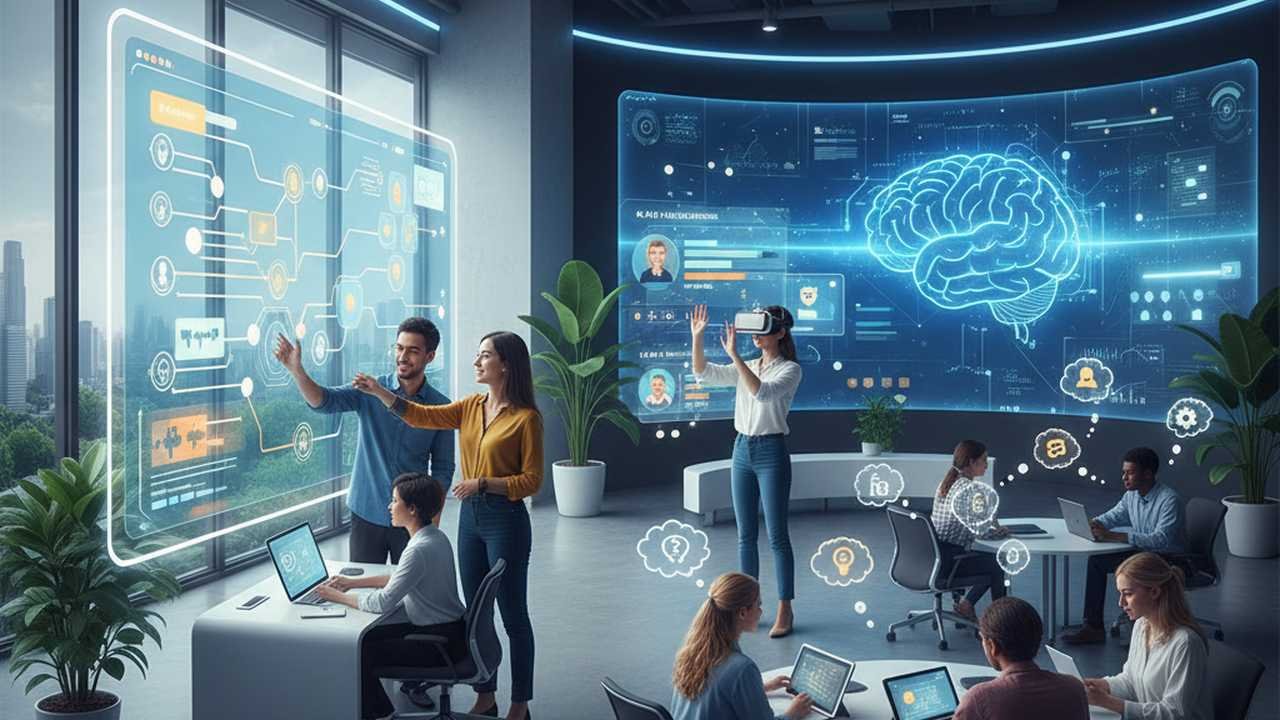Understanding the Urgency of Interactive Learning in Modern Education
The digital age has transformed the landscape of learning, and nowhere is this shift more palpable than in the realm of interactive e-learning. As students increasingly demand dynamic, engaging, and responsive educational experiences, the need for strategies that stimulate active participation has never been more urgent. Imagine logging into an online course that feels flat, static, and devoid of any real interaction; the disengagement is almost palpable, creating a sense of anxiety and missed opportunity. This is where understanding the critical role of interactive learning becomes essential. Education for Sparta offers a vivid example: immersive modules that replicate historical environments, complete with simulations of Spartan warfare and governance, instantly captivate learners’ attention and stimulate their curiosity. By incorporating sensory-rich content and gamified elements, instructors can ensure students remain fully engaged, avoiding the pitfall of passive consumption and fostering a deeper connection to the material. The immediacy of these techniques creates a FOMO-driven environment where learners are compelled to participate actively, knowing that missing out equates to losing invaluable insights and experiential learning.
Harnessing Gamification to Boost Engagement
Gamification has emerged as a cornerstone of effective interactive e-learning, providing learners with an irresistible incentive to engage fully with course material. Imagine a digital classroom where progress is tracked with vivid leaderboards, badges, and achievement milestones; each completion is a mini-victory that stimulates dopamine release, compelling students to dive deeper. Through education for Sparta, learners can participate in simulated Spartan training exercises, where successful completion of tasks unlocks new levels and rewards, creating a visceral sense of achievement. The sensory impact of interactive challenges – visual feedback, auditory cues, and tactile simulation – ensures that learners are not merely absorbing information but experiencing it firsthand. This approach taps into the innate human desire for recognition and progress, making participation feel urgent and necessary. By strategically designing gamified elements that reflect real-world skills and outcomes, educators can transform otherwise mundane content into thrilling, participatory journeys, ensuring that learners feel they are part of an exclusive, high-stakes educational adventure.
Incorporating Real-World Scenarios for Experiential Learning
Learning becomes unforgettable when students are thrust into scenarios that mirror real-life challenges. This is particularly potent when exploring historical or complex subjects, such as through education for Sparta, where students can step into the roles of Spartan citizens, strategists, or soldiers. These scenarios allow learners to confront ethical dilemmas, tactical decisions, and societal responsibilities in an immersive, controlled environment. By visualizing the consequences of their choices, students develop a nuanced understanding that transcends traditional rote learning. Vivid descriptions of Spartan battles, daily routines, and governance policies transport learners into a tactile, living history experience, enhancing retention and emotional investment. The urgency of engagement is heightened as learners realize that missing these interactive scenarios equates to missing out on the intricate layers of historical insight and practical problem-solving that static textbooks cannot convey. This approach ensures that active participation is not optional but essential, creating an irresistible pull toward fully engaging with the educational content.
Leveraging Multimedia for Sensory-Rich Learning
The human brain responds powerfully to multisensory stimuli, and interactive e-learning thrives when it incorporates diverse multimedia elements. Videos, animations, interactive timelines, and 3D models can transform abstract concepts into tangible experiences, allowing learners to explore environments and scenarios as if they were physically present. Through education for Sparta, digital reconstructions of ancient cities, temples, and training grounds immerse students in environments they could never visit in reality, stimulating curiosity and cognitive engagement. Soundscapes of marching soldiers, clashing weapons, and bustling marketplaces heighten the sensory impact, creating an urgent, FOMO-driven learning atmosphere where missing out on these experiences feels like a lost adventure. Integrating multimedia not only caters to varied learning styles but also ensures retention by linking information to vivid, memorable experiences. Educators can design pathways where each interaction uncovers new layers of knowledge, compelling learners to progress and actively participate at every stage.
Interactive Assessments That Drive Participation
Assessment is no longer merely a tool to measure knowledge – it has become a dynamic driver of engagement. Traditional quizzes can be transformed into interactive challenges, scenario-based simulations, and decision-making exercises that require critical thinking and active problem-solving. In education for Sparta, assessments might include planning military campaigns, managing resources, or negotiating alliances, each requiring learners to apply knowledge in meaningful contexts. The immediacy of feedback, combined with the immersive nature of the tasks, creates a compelling sense of urgency: learners must participate actively to succeed and avoid falling behind. Interactive assessments also provide opportunities for social learning, allowing students to collaborate, compete, and share insights in real time, further enhancing engagement. By making evaluations an integral, thrilling part of the learning journey rather than a perfunctory exercise, educators ensure that active participation becomes an unavoidable, highly motivating aspect of the educational experience.
Utilizing Adaptive Learning Technologies
Adaptive learning technologies offer an unparalleled advantage in tailoring educational experiences to individual needs, maximizing both engagement and effectiveness. These systems analyze learners’ interactions, performance, and preferences to dynamically adjust content, difficulty, and pacing. Within the framework of education for Sparta, adaptive modules might present advanced tactical challenges to students excelling in strategic thinking while offering guided, foundational exercises to those who need additional support. This personalized approach not only ensures learners remain challenged and motivated but also heightens the urgency to engage, as each module is crafted to push them just beyond their comfort zone. The sensation of progression, personalized challenge, and real-time feedback fosters a FOMO-driven environment where learners feel compelled to participate fully to unlock the next level of insight or skill. By leveraging adaptive learning, educators create interactive experiences that feel alive, responsive, and intimately attuned to each learner’s journey, increasing both engagement and educational impact.
Fostering Social Interaction and Collaborative Learning
Interactive e-learning thrives when learners are not isolated but actively collaborating with peers and instructors. Social interaction introduces accountability, diversity of thought, and the excitement of shared discovery, all of which heighten engagement. In education for Sparta, group projects could simulate councils of Spartan leaders or cooperative training exercises, where students must strategize together to achieve objectives. Real-time discussion boards, live debates, and peer reviews amplify participation, creating a sense of community and urgency: learners are driven to contribute, lest they miss out on vital collective insights. The tactile and emotional experience of collaborating, negotiating, and presenting ideas cultivates deep cognitive and social engagement, transforming learning from a solitary task into a vibrant, participatory event. Social interactivity ensures that knowledge acquisition is intertwined with relationship-building and experiential involvement, fostering an immersive environment where active participation is both necessary and rewarding.
Integrating Real-Time Analytics and Feedback
Real-time analytics and instant feedback are powerful tools for sustaining learner engagement and encouraging active participation. By tracking progress, identifying challenges, and providing immediate, actionable insights, educators can create a responsive learning ecosystem. In the context of education for Sparta, analytics might reveal how effectively a learner navigates complex tactical simulations, highlighting areas for improvement or suggesting alternate strategies. The immediacy of this feedback generates a palpable sense of urgency: learners can see the direct consequences of their actions and adjust in real time, reinforcing the value of engagement and participation. Transparent analytics also foster a sense of accountability and motivation, ensuring learners remain immersed and proactive in their learning journey. By integrating these tools, educators cultivate a highly interactive, adaptive, and FOMO-driven environment where every decision matters and active participation is the key to success.
Designing for Accessibility and Inclusive Engagement
Effective interactive e-learning must be accessible to all learners, ensuring that diverse needs and abilities do not become barriers to participation. Accessibility features such as screen readers, captioned videos, adjustable interfaces, and alternative input methods enable every learner to fully engage with content. Through education for Sparta, inclusive design ensures that even those with varying abilities can participate in immersive historical simulations, tactical exercises, and collaborative projects. By considering accessibility from the outset, educators create a sense of urgency and belonging: no learner is left behind, and the FOMO-driven motivation extends to all participants. Inclusivity enhances engagement by ensuring that the richness of interactive content – visual, auditory, and tactile – is available to everyone, transforming the learning experience into a universally compelling and immersive journey. Inclusive strategies not only meet legal and ethical standards but also elevate the overall quality and impact of the educational experience, making active participation both possible and irresistible.
Implementing Trusted Platforms and Verified Content for Confidence
Finally, the credibility and trustworthiness of the e-learning platform play a critical role in driving active participation. Learners are more likely to engage fully when they know content is accurate, instructors are verified, and the platform ensures secure transactions and responsive support. In education for Sparta, using licensed historical sources, expert commentary, and verified simulations ensures learners receive authentic, high-quality experiences. Additionally, platforms offering secure access, verified payouts for premium content, and responsive customer service enhance learner confidence, creating a compelling sense of urgency: missing out on such a reliable, enriched, and meticulously designed learning experience would be a loss too great to ignore. Trust and authenticity amplify the FOMO effect, ensuring learners remain deeply engaged, motivated, and fully immersed in the educational journey.
Don’t wait – immerse yourself in the most dynamic and interactive e-learning experiences today. Join platforms that offer education for Sparta and experience history, strategy, and interactive learning like never before. Every moment you delay is a moment of knowledge and opportunity lost. Act now and participate fully in an education revolution where engagement, immersion, and interactive experiences redefine what it means to learn.

